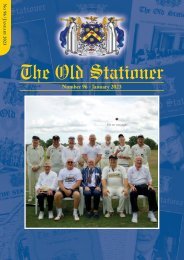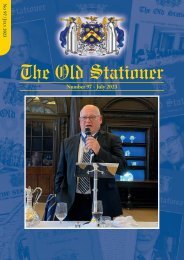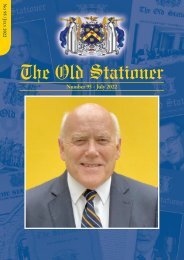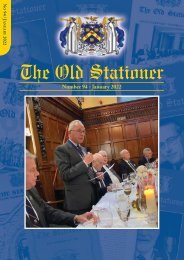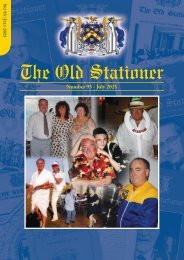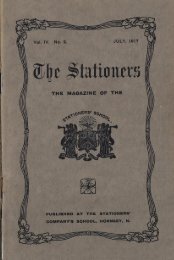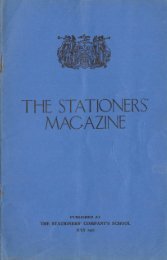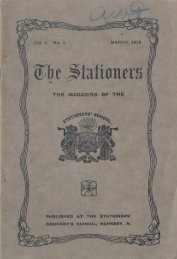OSAmag81
You also want an ePaper? Increase the reach of your titles
YUMPU automatically turns print PDFs into web optimized ePapers that Google loves.
T h e O l d S t a t i o n e r - N o 7 9<br />
Genesis 1, verses 26-28. There was an<br />
Address and Prayers. The Music at the<br />
end of the Service was ‘Sailing’ (Gavin<br />
Sutherland 1972) performed by Rod<br />
Stewart.<br />
The photograph was taken on holiday in<br />
Porthleven, Cornwall in May 2008.<br />
A Life by Michael Spinks<br />
Harry Roy Spinks, Roy, to distinguish him<br />
from his father also a Harry, was born on<br />
20 April 1924 inside the sub¬division of<br />
Tollington in the Registration District of<br />
lslington in the County of London, at least<br />
that is what his birth certificate states. He<br />
was the beloved elder son of Harry Claude<br />
and Beatrice Maud Spinks, brother of<br />
Peter. No two brothers could be more<br />
unalike.<br />
Roy attended the Stationers Company<br />
School and studied electronics and radio<br />
engineering at night school and became a<br />
highly successful electronic engineer.<br />
From his own CV he writes,<br />
“1943-1947 Royal Air Force, Leading<br />
Aircraftsman, Wireless Mechanic South<br />
East Asia Command” “1948-1949 Air<br />
Service Training, Hants. Student. War<br />
interrupted studies leading to Institute of<br />
Electrical Engineers and City + Guilds<br />
Radio and Telecommunications exam<br />
results. Maybe it is true that he never<br />
threw anything away. We have the exam<br />
results to prove it.<br />
He worked successively in London for<br />
The Gramophone Company at Hayes and<br />
then for Murphy Radio Electronic<br />
Division Engineer where he did work for<br />
Swedish Air Force radar. He subsequently<br />
signed the Official Secrets Act. I trust<br />
nobody will be done for revealing that the<br />
Swedish Air Force owes him a debt of<br />
gratitude.<br />
As a young man he played tennis. It was at<br />
a tennis club that he met the lady who<br />
soon became his wife, Pamela Mary<br />
Cambridge Clarke. They were married at<br />
the Parish Church of St. Aldhelm,<br />
Edmonton on March 15th 1952. They<br />
became the proud parents of Michael,<br />
Susan and Richard and the grandparents<br />
of Robert, Alex, Timothy, Fiona, Owen,<br />
Kathleen, Freya and Megan.<br />
Roy and Pam moved to 3 Gayton Road,<br />
Southend-on-Sea, Essex late in 1952. He<br />
started working for EK Cole in Southend<br />
in January 1953 and wrote up a set of notes<br />
“Memories of EK Cole 1953-1957” A<br />
colleague from those days, Alan Moltino,<br />
regrets that he cannot attend today. Neither<br />
can his brother, Peter, living in Devon or<br />
his old “cousin” for want of better words,<br />
George Trowbridge.<br />
Roy left EK Cole in 1957 and worked as a<br />
Principal Development Engineer at the<br />
Plessey Company, Ilford. He acquired a<br />
Thames Minibus, 00 3609, and transported<br />
a group of SE Essex residents to Ilford<br />
every working day between 1957 and<br />
1966. That minibus became almost a<br />
second home and was used as a camping<br />
base at Burnham on Crouch and for<br />
transporting the whole family for many<br />
summers on the annual overnight trip<br />
down to Praa Sands in Cornwall. Neither<br />
the MS nor the M4 existed then so it was<br />
more of an adventure in its own right than<br />
it would be now. Turning back to his<br />
career, it was whilst at Plessey that he was<br />
involved in the development of a family of<br />
UHF Airborne and Marine Transmitter<br />
Receivers for the RAF, RN and “friendly<br />
governments”. That led to an opportunity<br />
for the family to resettle in South Africa<br />
but it didn’t happen.<br />
It was whilst living at Southend that a<br />
passion for sailing was ignited. He built his<br />
own Lazy E, a twin manned sailing boat,<br />
somewhat bigger than an Enterprise, in<br />
the garage, which he had also built, in his<br />
back garden and sailed it for many years on<br />
the River Crouch at Burnham as a member<br />
of Burnham Sailing Club. For the last 10<br />
years of his life he was a Member of<br />
Creeksea Sailing Club.<br />
The family moved to Muswell Hill, North<br />
London in 1966 when Roy joined the<br />
family business, EFG, as a Director.<br />
Relationships between the generations on<br />
the male side of the Spinks family have<br />
never been the easiest and he departed in<br />
1969. He joined Marconi Space and<br />
Defence Systems at Stanmore as a<br />
Principal Quality Engineer on the Stingray<br />
project essentially being the Quality<br />
Controller to do with vendor and subcontractor<br />
plans.<br />
Perhaps his radio engineering days at<br />
Plessey and then at Marconi were<br />
professionally his most creative and<br />
satisfactory opportunities. He had joined<br />
the Institution of Electrical Engineers in<br />
1947, became a Chartered Engineer, and<br />
received congratulations in 1997 for having<br />
been a member for 50 years. He was also a<br />
member of The Chartered Institute of<br />
Quality Assurance.<br />
After leaving Marconi he rejoined the<br />
family business, this time as Managing<br />
Director. He put up the new buildings at<br />
Liverpool Road, fought the good fight<br />
against British Rail when they damaged<br />
those buildings, fought each of the many<br />
(hundreds or thousands of them )parking<br />
tickets that our drivers accumulated,<br />
supported the Freight Transport industry<br />
inside London, ensured our banking was<br />
done correctly each day and defied any<br />
mugger to attempt a robbery on his daily<br />
visits to the Nat West Bank branch in<br />
Upper Street. Working Life in the<br />
wholesale industry was a bit more civilised<br />
when Roy was at EFG and a daily luncheon<br />
break was taken at either of the two Italian<br />
Tavernas at Highbury Corner.<br />
He did effectively retire but nobody is<br />
quite sure when because he retained keys<br />
to get in for many years and had an<br />
unhealthy attachment to the company’s<br />
fork lift trucks. Very little was more<br />
important than checking that they were<br />
properly on charge each weekend.<br />
What were Roy’s passions? Certainly for<br />
sailing which he maintained for 50 years.<br />
He was sailing independently last summer.<br />
Whilst he never learned to swim and was<br />
baled out of the River Crouch only last<br />
June having been outside his boat for 20<br />
minutes and unable to get back in, he was<br />
never deterred. In his later years he went<br />
on many Jubilee Sailing Trust voyages in<br />
their two large three masted schooners to<br />
places like The Canary islands and Lisbon.<br />
He blacked out preparing for one such<br />
trip, ended up in hospital, forfeited the trip<br />
and never fully forgave them for not taking<br />
him back on board again.<br />
He was involved in The Worshipful<br />
Company of Loriners. Before him, his<br />
father was and now his grandson, Robert,<br />
is a member. He became and was very<br />
proud of being a Freeman of The City of<br />
London. He had his loyalties to a select<br />
group of clubs which he actively maintained<br />
and supported for many years, The Burma<br />
Star Association, The Royal Air Force<br />
Association, The Royal British Legion, the<br />
United Wards Club of the City of London,<br />
the City Livery Club and was Chairman<br />
of the Aero Section of The City Livery<br />
Club. He also supported the RNLI and<br />
the National Memorial Arboretum and<br />
other voluntary associations. Whilst<br />
Chairman of the Aero Section he<br />
accompanied John Jordan chairman for<br />
many years ofJordans the Flour Millers<br />
who supplied the Essex with its flour) who<br />
piloted his own biplane, by approval onto<br />
an RAF base. What was not approved was<br />
the manner of their departure which<br />
involved doing barrel rolls in the biplane<br />
down the length of the runway and which<br />
38



